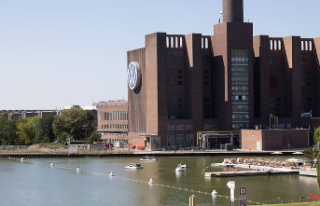The Holodomor in Ukraine was more than the result of famine. Stalin felt threatened by the Ukrainian protests against his forced collectivization. For the Soviet leadership, the goal was to destroy Ukraine as a nation.
Although around four million Ukrainians died in the Holodomor of the early 1930s, the details and background of "killing by starvation" - as the Ukrainian word is translated - were known only to a few in Ukraine until the collapse of the Soviet Union. Like many other things, the Holodomor was subject to a taboo on silence in the USSR.
Even after 2005, when then-President Viktor Yushchenko made the Holodomor the central theme of Ukrainian history politics for the first time, the main narrative of Russian propaganda continued to be adopted in parts of Ukraine. Namely, that the deaths of millions are a common tragedy of many peoples of the Soviet Union, from which the Russians and Kazakhs also suffered - a result of the drought and the forced collectivization of agriculture.
It was Yushchenko, who came to power through the Orange Revolution, who introduced the annual Holodomor lesson in schools and advocated the building of a Holodomor museum. In 2006, at the beginning of his term in office, the Ukrainian parliament declared the Holodomor a genocide against the Ukrainians for the first time. Since then, more than twenty countries have followed this example, including Germany.
As expected, the subject receded into the background again during the period of the formally pro-Moscow President Viktor Yanukovych. That changed in 2014, after the Russian annexation of Crimea and the outbreak of the Donbass War. Since then, the Holodomor has steadily gained prominence in Ukrainian memory - a process that came to an end with the start of the great Russian invasion on February 24.
The fact that Yanukovych's electorate, who live in the predominantly Russian-speaking south-east, were initially skeptical about the Ukrainian interpretation of the history of the Stalin era is mainly due to the influence of the Russian media. Yushchenko was always laughed at there with his alleged "fixation" on the Holodomor. The Holodomor itself, as so often in history, is a complex affair.
Historically, the Holodomor is about the famines of 1932 and 1933, which are distinct but related. The famine of 1932 was not planned as such and actually arose more as a result of forced collectivization. There were deaths almost everywhere in the Soviet Union. Had the Holodomor stopped in 1932, Ukraine would have died less than a million—a number that increased fourfold in 1933.
The hunger of 1933 was not aimed at the Ukrainian population as a whole, but it was aimed at the political Ukrainian nation as such. There were also peasant uprisings against forced collectivization in other Soviet republics, but in Ukraine they were more massive and demonstrations were often explicitly held with national slogans. At the same time, targeted repressions against Ukrainian churches and, above all, the almost complete annihilation of the then Ukrainian intelligentsia took place. The Holodomor was genocidal because the Stalinist Soviet Union - like Putin's Russia today - was concerned with the annihilation of Ukraine as a nation. The Bundestag agreed with this view with a comparatively reserved wording. The Bundestag resolution states that "the striving of the Soviet leadership for control and oppression of the peasants" and "the Ukrainian way of life, language and culture merged" in the Holodomor. Therefore, "a historical-political classification as genocide is obvious".
Whether peasant resistance really represented a national danger for Stalin is clearly difficult to assess. However, it can be assumed that he at least believed this himself. In addition, Stalin probably feared losing parts of the Ukraine or the Ukraine as a whole to Poland. The background to his actions may not have been racial hatred. But the targeted annihilation of the Ukrainian political nation did take place in 1933 - unlike in 1932.
In this context, the Bundestag's recognition of the Holodomor as genocide is right at a time when many Ukrainians are seeing their own history with new eyes. For the people in Ukraine, where hardly a family was not affected by the Holodomor, this signal from Germany means a lot, because Ukraine, together with Belarus, was one of the main victims of the Second World War in the time that followed. In view of the Russian war of aggression, it is also of great importance for the Ukrainians that more people in Germany learn about this tragic page of Ukrainian history.
However, the cautious wording in the Bundestag resolution also remains correct, because much of the Holodomor has still been clarified - mainly because of the silence in the Soviet era. Historical research must go on here. And it's important in the assessment to avoid equating it with the Holocaust, which is drawn from time to time. The suffering of the Ukrainian people at the hands of the Holodomor was bad enough without such comparisons.












